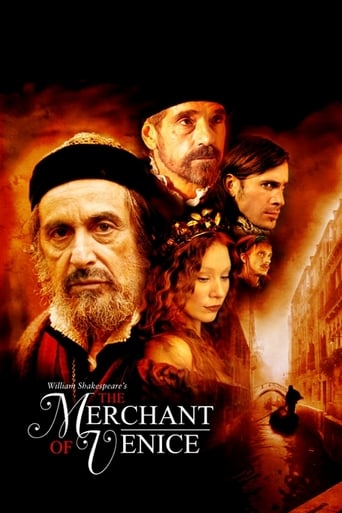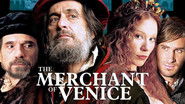SnoopyStyle
It's 1596 Venice. Jews face restrictions even in the liberal city state. They are forbidden to hold property. They charge usury which is something unChristian and are demonized for it. Bassanio (Joseph Fiennes) asks 3000 ducats from melancholy Antonio (Jeremy Irons) to woo wealthy heiress Portia (Lynn Collins). Bassanio is able to get moneylender Shylock (Al Pacino) to make it an interest-free 3 month loan but Antonio must give a pound of flesh if he fails to repay the loan. There is animosity on both sides. After Antonio's ships are lost, Shylock goes to court seeking his pound of flesh.This is one of the more troubling Shakespearian plays to a modern audience. The villainous Shylock is the quintessential money-grubbing vengeful Jew that is the caricature Jew for every antisemite. There is no doubt that Al Pacino is brilliant and injects a humanity into a villain that is usually two-dimensional. In fact, it is questionable if Shylock is truly a villain in his hands. The comedy may not wear well especially as a modern play but Pacino turns it into something more compelling.
jwv-823-79715
This is a great popularized and verbally simplified version of Shakespeare for a wide audience with a top-notch cast. Especially Al Pacino's performance is genuinely moving, in his assuming the role of an embittered and torn old man, with superior feel for emotional shift and outstanding voice-acting. Lynn Collins also convinces with a good performance. The soundtrack is likable, light and strangely enchanting, and the scenery is beautiful.The movie does a great job of complicating the character of Shylock, and makes the viewer question his role as a victim or a villain. In the end, nobody will feel unmoved by the truly excellent and genuinely poignant court scene.The courting prices are shallow stereotypes and constitute the only kind of (unintentional) humour this otherwise dry movie brings. I do not understand the choice of not giving the play-appropriated importance and weight in consequence to the casket-scenes. This is strange, since the movie is clearly a dramatized version of the play, and else there is not much that distinguishes Portia from a common harlot when every man can come make his suit without consequence. It saddens me to see the superficiality of these scenes, because Shakespeare did provide more complex and sympathetic characters in the original.
leplatypus
It starts strong: Captions say that the Jewish discrimination and ghetto have been invented in this city of love and it's really the first time that I discovered the fact. It's again a proof that our European democracies are really old senile states plagued by amnesia if it isn't they are just deceptive and try to brainwash their citizens. In my opinion, the red hat worths a yellow star.Next, if the story is a bit hard to follow as we need a time of adaptation to the flow of a classic play, it becomes more and more interesting: Pacino plays an old Jew that denounces dryly this discrimination. So, when Al's talent meet Shakespeare's inspired quill, it's fantastic: His speech about being just another human being is a great moment! His speech against slavery hits bullseye: a law can be cruel as justice needs also mercy. But Shakespeare isn't only a dissident: his speeches about music and love are really stunning as well. If we can regret that the romantic Venice isn't shown (no piazza, basilica or palazzo) and that some back story aren't really interesting (Al's daughter), the movie has a last surprise as the newcomer Lynn Collins is really mesmerizing, especially when she crosses dressed! The way her character plays and fight for her lover with tremendous law ability and heart, you can conclude that Shakespeare draw a beautiful portrait of a strong woman in a time that was strictly masculine.In conclusion, this movie should be a recommendation for those who would like a good introduction to Shekeaspeare's talent: a bit like our French Moliere, his sharp criticism is dressed under comedy and frivolity so the powerful idiots can't understand what it happens! And if you heard that the movie is anti-semitic, it's not true and it's a trick to strangle the truth: opening the veil about an antisemitic world isn't the same as being antisemitic.(NB: a more personal note: I watched it on evening after having finished reading Dan Brown's "Inferno" in the afternoon. Yesterday, I watched "Deerfield" with the same Pacino. The book takes place in Firenze then Venezia. The movies happen in Firenze then Venezia. The probabilities are so astounding that I ask if I should take this a divine wink? If it's a message, which one? I remember that it has already happens with my last "x-files" review and that I actually read Mark Millar's "Secret Service" which shares the same threat (overpopulation) than "Inferno"! Something is building up through my cultural choices, uh … ?)
cgrimmette
In all areas this Shakespeare film adaptation not only makes the great bard accessible to those unfamiliar with his work but to the sometimes mistaken belief that Shakespeare works transfer poorly to the screen. Off course the great mans work brings out the best in actors performance and this has got the lot. Lyn Collins excels, Irons is five star along with the rest. Al Pacino rubber stamps his position as probably the best film actor alive today. His portrayal of the Jew Shylock is clever and brings out a sense of compassion for Shylocks predicament and the situation he finds himself in. This lessens the call of the anti-semitic brigade as the context Shylock finds himself in at that time can be applied to non Jewish situations today.




